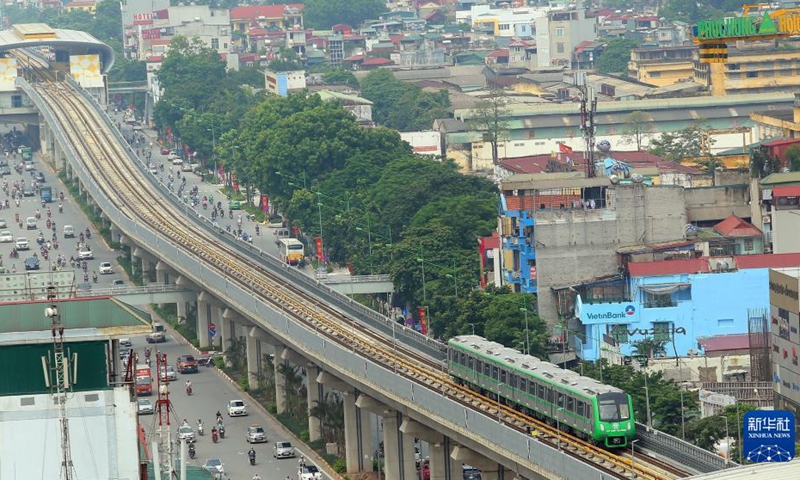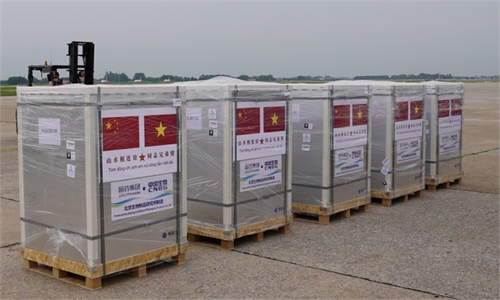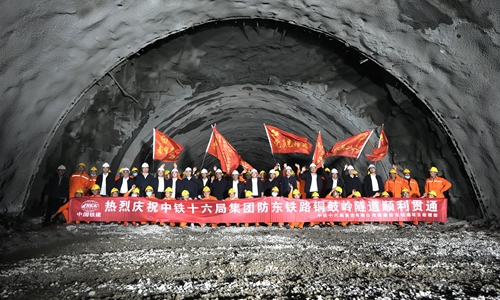COMMENTS / EXPERT ASSESSMENT
Western media's lies about Vietnam metro project are shameless

The Cat Linh-Ha Dong metro line in Hanoi, Vietnam Photo: Xinhua
The recently inaugurated metro line in Hanoi, Vietnam has now officially entered service after a two-week free trial operation. The fact that a smaller number of riders was recorded, compared with the trial period, is a chance Western media outlets could not miss to "question" any project where China or Chinese firms participate.
The Cat Linh-Ha Dong metro line, the first of its kind in Hanoi, was built by the China Railway Sixth Group and is expected to ease traffic congestion in the city which is saturated with motorcycles and bicycles.
While citing ticket sales on the first days, the Voice of America (VOA) reported on Monday that "the number of passengers was low, at approximately 12,000 per day, equivalent to 60 people per trip, accounting for only 8 percent of the capacity."
In addition, the report did not forget to criticize the participation of Chinese firms and praise Japanese contractors, regardless of the possible reasons behind the "lack of riders" and downplaying the advantages of Chinese firms compared to others, including Japanese companies.
There are several possible reasons behind the relatively insufficient quantity of passengers. First, its convenience has not been fully appreciated by the local residents who are used commute by motorcycle, rather than by public transport. Second, it still takes time and effort to better connect the metro line with other public transportation to set up a sound public transport system, not to mention that it is the first metro line of the city which reaches limited places as far.
Obviously, all these factors do not matter in the eyes of Western media outlets who only want sales data on the first day to hype up "problems" in the projects, as long as the projects were promoted under the China-proposed Belt and Road Initiative (BRI) or there is a trace of participation of Chinese institutes or firms.
Even though, such kind of ill-intended "questioning" or vilification may persist, their marginal effect has diminished as the BRI and other cooperation initiatives between China and other countries have delivered successful outcomes and locals have seen tangible benefits.
Chinese firms have strong advantages in seeking cooperation with others, especially in the infrastructure sector. From high-tech, like 5G networks, to bridges and railways, China has developed sound and superior capacity in building such projects with shorter construction cycles, more perseverant engineers and workers and highly competitive costs.
Such projects also perfectly meet the development demand of local economies. Taking the metro line in Hanoi as an example, local authorities obviously chose to promote the project to accommodate the growing traveling demand and boost economic development in the long run.
There is no denying that during the promotion of the projects, different setbacks might occur but their benefits are clear for all to see, including local governments and residents.
By vilifying related projects with groundless "debt trap" accusations or alleged operating "difficulties," the West is questioning the capabilities of the authorities of the involved countries and regions as well. As a matter of fact, all countries and regions go through an elaborative assessment before entering a collaboration agreement. And the fruitful BRI, with over 2,000 cooperative projects, has told a vivid story to the international community.
In fact, the rush from the West to sell their own version of the BRI, regardless of the so-called "Build Back Better World" (B3W) plan under the G7 framework or the recently announced Global Gateway by the EU, have proved the success and promising prospect of the BRI.
In the end, no one can say that only Chinese firms can launch a beneficial cooperation with other developing economies. It is welcome to see more participation by rich countries to facilitate the growth of developing nations based on mutual respect and even compete with Chinese firms as long as under fair and impartial environment. However, continuing to vilify projects with the participation of China will only end up in futile attempts.
The article was compiled based on an interview with Zhou Shixin, Director of the Institute for Foreign Policy Studies at the Shanghai Institute for International Studies (SIIS). bizopinion@globaltimes.com.cn



